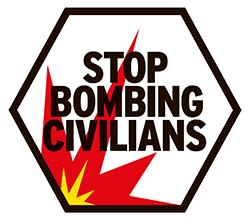Explosive weapons
Explosive weapons including landmines and cluster munitions continue to kill and injure civilians in countries all around the world.

© Till Mayer/HI
Explosive weapons including landmines and cluster munitions continue to kill and injure civilians in countries all around the world.

© Till Mayer/HI
More than half of the world's countries are contaminated by explosive remnants of war, including landmines and cluster munitions.
These weapons can lie dormant for many years, claiming victims long after a conflict has ended. They are a significant cause of disability, instilling fear in whole communities, deepening poverty and acting as a lethal barrier to development.
Faced with the devastation caused by antipersonnel landmines and cluster munitions, Humanity & Inclusion realized that medical care alone would not be enough. We therefore made a commitment to work on all levels to help survivors of mine incidents and their communities lead independent lives.
Since 2014, Yemen has experienced every manner of explosive weapons—aerial bombs and missiles, artillery, mortars, and improvised explosive devices (IEDs), and much more. The explosions destroy bridges, ports, roads, hospitals, water systems, and generate long lasting civilian harm. A June 2020 Humanity & Inclusion report highlights six case studies, showing the extent and impact of such bombings. Download the report, "Death Sentence to Civilians: The Long-Term Impact of Explosive Weapons in Populated Areas in Yemen."
Humanity & Inclusion released a similar report in October 2021, detailing the impact of explosive weapons contamination in Iraq. Download the report, "No safe recovery: The impact of explosive ordnance contamination on affected populations in Iraq."
Experiencing conflict since 2011, 11.5 million people in Syria live in areas contaminated by explosive hazards. Nearly 6 million Syrian refugees have fled to neighboring countries. In Jordan and Lebanon, Humanity & Inclusion provides support to Syrian refugees, many of whom are recovering from conflict-related injuries.
Humanity & Inclusion is also responding to the Ukraine crisis, where civilians are being killed, injured and displaced by explosive weapons.
Over the years, Humanity & Inclusion has evolved into the world's most comprehensive mine action organization, working to prevent accidents through education and clearance, and to support the victims.
Our donors make it possible to train and deploy teams of deminers to identify and clear conventional and improvised weapons from the paths of civilians. We work to educate the local population, especially children, how to spot, avoid, and report the weapons they find. Such lessons are especially vital to impart to people returning home after conflict-induced displacement.
People who survive the blasts and burns of war are in desperate need of rehabilitation. Through physical therapy and psychosocial support, Humanity & Inclusion teams work to restore the physical and mental strength of survivors. When physical recovery has advanced, it's often possible to fit artificial limbs and braces to ensure that the survivor can regain their mobility, and with that independence. To smooth their reintegration into the community, our inclusion specialists work with survivors to ensure their access to education, income-generating activities and decent work, and sport.
Humanity & Inclusion, in conjunction with new technology companies, is testing drones to assist with mine clearance and build a detailed picture of what’s on the ground.
Drones, which can map suspected hazardous areas remotely are revolutionizing landmine clearance operations. Drones help target mine clearance areas more precisely, improve the safety of humanitarian deminers and reduce the length of time it takes for teams to return contaminated land to civilians.
Humanity & Inclusion was created in 1982 (under the name Handicap International) in response to the horrific landmine injuries suffered by Cambodian refugees. Soon, we realized that action needed to be taken at an international level to ban these indiscriminate weapons.
Humanity & Inclusion played a key role in founding the International Campaign to Ban Landmines, for which we were jointly awarded the Nobel Peace Prize, following the signing of the Mine Ban Treaty in 1997.
We are a founding member of the Cluster Munition Coalition, and we actively support the Convention on Cluster Munitions, which came into effect on August 1, 2010.
Humanity & Inclusion is also a founder and coordinating member of Landmine and Cluster Munition Monitor, which monitors these two international treaties and produces annual reports on their implementation. And we are a founding member of the International Network on Explosive Weapons.
During recent armed conflicts, explosive weapons have been used on a massive scale, killing and injuring thousands of civilians. When explosive weapons are used in populated areas, a shocking 90% of casualties are civilians.
Humanity & Inclusion is working to build a massive movement to stop the bombing of civilians. Find out more.

Urgent action is needed to protect children and families!
SIGN THE PETITION NOW
Read more

Cluster bombs have killed and maimed thousands of civilians, who are overwhelmingly the main victims. But what exactly are cluster munitions?

Chad: HI achieved a world-first in humanitarian mine action
In March 2021, HI finalized its two-year drone experimentation in Northern Chad with its partners Mobility Robotics and FlyingLabs Côte d’Ivoire.

40th Anniversary | Gneip's story: From landmine survivor to policy advocate
In 1982, two doctors working in refugee camps in Thailand started helping survivors of landmine explosions who had been injured fleeing across the heavily mined border. There they met Gniep, a young girl who had lost her leg after stepping on a landmine. Gniep was one of the first children ever supported by Humanity & Inclusion. This is her story.
Get the latest news about Humanity & Inclusion's work delivered straight to your inbox.
ABOUT US
Humanity & Inclusion U.S.
8757 Georgia Avenue
Suite 420
Silver Spring, MD 20910
MORE INFORMATION
Humanity & Inclusion is a nonprofit 501(c)(3) organization (EIN/tax ID number: 55-0914744). Contributions are fully tax-deductible to the extent allowable by law. CFC #51472
None of the funds donated through this website will benefit activities in the following countries: Cuba, Iran, North Korea, the Crimea Region, or Syria. Humanity & Inclusion does not have programs in all of these countries.